
Graduate Interview: Jayson Teaching in Thailand
In this interview, we’ve had a chat with Jayson from the Philippines, who is currently teaching in Thailand. He’s shared his journey of adapting to life as a teacher in Thailand, along with valuable tips for building a successful ESL teaching career.
Thailand has long been a popular destination for ESL teachers, offering unique cultural experiences, welcoming communities, and countless teaching opportunities. Whether you’re new to teaching, or an experienced teacher seeking opportunities abroad, Jayson’s tips and insights offer valuable guidance on how you too can launch an English teaching career in Thailand.
Let’s explore what he has in store for us!
About Jayson
Jayson is an experienced ESL teacher from the Philippines with nearly 20 years of teaching experience. He currently works as an English conversation teacher for middle and high school students in Bangkok, Thailand, focusing on boosting his students’ confidence and helping them express themselves naturally in English.
Name: Jayson Benoza De Asis
Nationality: Filipino
Profession: English language teacher
Experience: 19+ years
Looking ahead, Jayson is keen to further expand his teaching career by exploring opportunities in other countries. He continues to enhance his skills and knowledge to bring the best to his students worldwide.
Jayson’s interview:
💬 How long have you been teaching English, and how did you start?
“I have been teaching for almost twenty years. I first pursued my teaching career in my home country, the Philippines for 5 years in high school and vocational students. For a couple of years, I was adjusting how to teach students who were almost my age at vocational school, but later on, I got adjusted. Afterward, I moved to Thailand in January 2011 for greener pastures.
Thankfully, I have been teaching here in Thailand for almost 15 years since then. I started teaching from kindergarten to primary students. It was a brand-new environment, age levels, culture, and all. It was not easy at first, I needed to adapt, but eventually, it went well. Finally, I found a job of my expertise with middle and high school students.”

💬 What made you decide to pursue an English teaching career?
“When I was schooling, I started loving the English language the most, especially during my high school years. One of the most significant factors is my former high school English teacher. His teaching methods made me love this subject because I understand the four micro skills in English clearly because of his strategy and teaching approach.
After that, when I took the Bachelor of Secondary Education course in college, my first choice was to major in English. Fortunately, I passed all the requirements, like the entrance test, interviews, and others to be an English major student. Finally, when I pursued teaching, I became passionate about it and even more dedicated over the years.”
💬 Where do you currently teach, and what are your responsibilities?
“I am presently employed as an English conversation middle and high school teacher at a private school in Bangkok for almost three years. Previously, as I have mentioned, I taught kindergarten and primary levels for twelve years in Thailand.
My responsibilities are to manage various classroom activities. I motivate students to express themselves in English, portray role play, encourage them to shun shyness, and implement interactive classroom activities useful in daily life, paperwork to record their progress, semestral grades, and certificates when they finish the course level.
Additionally, I need to prepare the English morning activities for the primary students around the school stage with the assistance of Thai teachers twice a week before they have the flag ceremony. It is quite common in Thai schools to see foreign teachers with their selective students present 10–15-minute activities as part of the school morning routine.”
💬 How did you find this teaching opportunity, and what made you choose Thailand as your teaching destination?
“I reckon teaching has no limit. It will never stop. As a teacher, it’s my joy and passion to teach whether at school, home, church, or everywhere I go. Every year new students enroll in schools in their local town up to the most famous universities in the city in each country. Schools are everywhere, so there are vast opportunities if you find a teaching job.
Plus, the shortage of teachers is most common in Western countries like Australia and New Zealand, so it is a great opportunity for all dedicated teachers to give it a shot anywhere around the globe.
In 2010, I communicated with my former teaching companion in the Philippines, who was teaching in Thailand. He told me that it is easy to find work here and that the cost of living is low. That made me convinced to try a better career in Thailand, so I gave it a burl, and thankfully, I got the job early the next year.”
💬 Could you give us a glimpse of what a typical workday looks like for you?
“My normal workday starts on or before 7:30 in the morning to have my biometric attendance at the school’s office. I have a duty on Mondays and Tuesdays for the English morning activities at 7:30-7:45. Our first-class period starts at 8:10 am and ends at 4:00 pm. In my school, we have 50 minutes for every class.
Almost all of the students are enrolled in special classes every 4:00 pm with the Thai teachers. Foreign teachers can go back home at 4 pm. Yet, it may vary in each school depending on their regulations. In the government schools, they usually start their day at 8 am and end at 3:30 pm.
The school provided an English Conversation room for me where the students come and study with me during their English Conversation Class. This program is more relaxed and natural because it focuses on how they converse which is useful in their daily lives. So interactive activities like energizers or warmers, games, songs, dances, and conversation routines by partner and by group will be a great help.
I make sure I give them exercises that are engaging and relevant to their ages and interests to make them more appealing to them. Speaking of, I teach grades 7-12, so I need to change my approach depending on the level of my classes. I meet each class once a week, and I really enjoy my job.
Occasionally, the school requires the English teachers to conduct English Camps and special shows, like the Talent Shows and other special events. Recently, we have successfully done it with kindergarten pupils.”
💬 What do you enjoy most about working with middle and high school students?
“Teaching middle and high school is just fun and exciting. The nature of my job is transparent and authentic. The setting is a bit informal yet conducive to learning and development. I am free to discuss and broaden my lessons which leads my learners to get involved and engaged, especially when I provide and introduce new things that arouse their interest. Teenagers are just delightful to be with.
Generally, Thai students like jokes and games especially at the kindergarten and primary levels but with middle and high school, they still enjoy having them, so I crack jokes and tell funny stories and have them play competition games so even the handful of wayward students tend to perform the given task and it is so fulfilling and effective.
One of the consolations of being a teacher is that you would be able to see from your students that they learned something and enjoyed it at the same time. They will leave the classroom with smiles on their faces with the excitement and expectations of studying with you again next time around.”
💬 What kind of teaching qualifications do you possess?
“I graduated with a Bachelor’s degree in Secondary Education, with an English major. I am also a licensed professional teacher in the Philippines and Thailand. While practicing my career, I’ve also attended trainings, webinars, seminars, and educational events like “The Oxford Professional Development Event” and “Empowering Teachers to Thrive in Today’s ELT World-Secondary”. Attending these have boosted my knowledge and allowed me to learn different approaches to teaching.
Another example is a 3-day Training in “Thai Language, Culture, and Professional Ethics Course for Foreigners”. By attending this course, we foreigners are abreast and enlightened about the Thai cultures, beliefs, and the like. Because of that, I have learned how to deal with Thai students and the locals. This helps me use the right approach in my teaching.
As a teacher, participating in these crucial events has given me the armor to face the ever-changing world in the teaching field. I observe that the competitive education industry is intensifying.
In this fast-paced world, keeping yourself armed with knowledge and credentials is essential. Hence, I also decided to complete a TESOL/TEFL course. I enrolled in the accredited 120-hour TESOL/TEFL course at World TESOL Academy. I have read substantially good reviews, testimonials, and confirmations about this reputable company.
Blessedly, I managed to complete the course, which allows me to keep running the race as an educator. I plan to go to other countries to further continue my teaching career for greater opportunities. The certificate, course outline, assessments, and recommendation letter from World TESOL Academy will certainly upskill my way to a better future and give me a wide range of knowledge and understanding as a teacher whether online or in a physical set-up. I would study again at World TESOL Academy with the other course packages they offer.”
💬 Is there a particular skill or methodology from your teacher training that you’ve found especially valuable when teaching in Thailand?
“Certainly, from my previous study of TESOL/TEFL with World TESOL Academy I have learned essential methodology like the learning styles to provide to my current students. It is important to remember that each student is different, whether they are a visual, auditory, verbal, or kinesthetic learner. Each one learns better with different learning types.
Also, providing variations of tests, games, and activities like role-play and performances makes my class enjoyable. By incorporating these styles and techniques you will discover your students’ strengths and weaknesses and eventually help you to assign and produce the amount and quality of activities and tests later on.
Furthermore, setting up a positive classroom environment is immensely important. Learners are motivated if the class culture has a positive vives. Teachers should maintain self-control especially when the students behave differently. Make sure you don’t show anger or frustration to make your classroom culture healthy and positive. Respect your students and in return, they will respect you. This leads them to follow your instructions and get more involved in the classroom discussion.
Classroom management is the most important thing to learn by the teacher. It doesn’t matter if you are the most intellectual educator in the world, if you cannot manage your class, you cannot be an effective teacher. Nevertheless, it can be learned over the years of your teaching. Be patient and enjoy the process. These are so effective for my middle and high school Thai students at this stage and certainly in all classroom situations. As teachers, we are not only agents of knowledge but also can learn from our students. Therefore, we ought not to stop learning.“
💬 How do you maintain your personal development as a teacher?
“In this day and age, the teaching field is getting more challenging and competitive. Teaching is also one of the professions that needs continuous development and acquisition of knowledge and skills.
I always aspire to keep myself updated, to upgrade my skills, and to be more innovative and ‘techie’. This help me make sure that I’m equipped with the wisdom and knowledge to ensure that I’m an effective and efficient educator. One way I do this is to join physical and online training such as professional development webinars and events with the inclusion of certificates for future use.
Another beneficial thing I do is listening to brilliant and helpful middle and high school teacher YouTubers, like Thom Gibson, an American middle school teacher, and a two-time teacher-of-the-year former educator in Austin. Also, CJ Reynolds teaches high school literature and The History of Hip-Hop in West Philadelphia. Chris from the Language House is good to add to my list. I’ve learned a lot from them. We can learn from the experts and I advise every new and experienced teacher especially middle and high school educators to watch and learn from them.
Finally, I connect, share, and discuss interesting topics with my fellow educators anywhere. In my former school, my fellow foreign English teachers and I would gather for events and special programs where we would collaborate to conduct meaningful and joyful activities for the students.
It’s a great way to obtain more knowledge about certain areas that are beneficial for me, my students, and my colleagues. Equally, I share my challenging and fulfilling experiences in my career so they can learn from me.“
💬 Would you recommend others to pursue English teaching certifications like TESOL/TEFL?
“Absolutely, I’ve recommended my friends and acquaintances to take the 120-hour TESOL/TEFL course at World TESOL Academy because it is a credible independent company that’s also a UK-registered learning provider. In fact, I recently discussed it with my friend here in Thailand, Ryan Duarte. He recently enrolled in the course and is making good progress with the course modules.
The course fee is very reasonable, and you can attend and study the modules whenever you have time available, which is perfect if you are already working or on busy schedules. Every module comprises all your needs to be an efficient and competent teacher in various classroom setups. Finally, there is no hassle with the certificate.
The staff is so friendly and accommodating. Studying at World TESOL Academy is one of the best decisions I have ever made for myself. I recommend World TESOL Academy to all aspiring teachers who want to teach the English language to non-native-speaking countries and even to seasoned educators who want to amplify their teaching approach to prepare and equip the students of this new generation globally.“
Want to start your teaching career? Get TESOL/TEFL certified:
To teach English overseas and online, you’ll need to have an accredited and recognized TESOL/TEFL certificate.
With World TESOL Academy’s accredited 120-hour TESOL/TEFL course, you’ll develop the necessary skills needed to launch your teaching career.
Or click here to get a free preview of the course.
.
💬 Could you tell us a little about your first week in Thailand?
“Certainly, I cannot forget my first-ever teaching experience here in Thailand. The school assigned me to teach kindergarten and primary level. Back then, it was my first time handling young learners. It was not easy at first because my teaching expertise was teaching high school students. Plus, it was hard to communicate with these pupils because I couldn’t speak the Thai language. It is preferable for every foreign teacher to have a little knowledge of Thai words when they teach here, especially at the government school.
Additionally, because they couldn’t understand me so well, they tended to make a lot noise. They were uncontrollable. I was so disappointed that I needed to go to the toilet for a while to take a deep breath and gather strength and patience. However, I motivated and comforted myself saying, oh Jayson, welcome to the new world. I felt upset yet full of hope and determination that I could surpass this dilemma.
Years passed by, and I have since learned how to deal with different types of students. After almost fourteen years of teaching in Thailand, I can now handle classes from kindergarten to high school. I can say that Thailand gave me more opportunities to teach different ages and widen the range of my experience which I believe can be useful for my next teaching destination.
Other than that, Thai students are very sweet. They usually hug me when they see me. Students give you flowers and stickers on Valentine’s Day, Wai Kru (ceremony tribute for teachers), and Teacher’s Day. Thai teachers are kind, a handful of them can talk to me and desire to know me well.“
💬 Do you have any fun memories from back then?
“One of the unforgettable experiences I had was when I was featured on Thailand National Television, MCOT HD Live Channel 30 during my actual teaching at my former school in October 2020. Here’s the link for your reference.
The school chose me as one of the selected teachers to be featured on TV at a leading primary government school in Bangkok. This experience was so surreal. I was so grateful and overwhelmed to be part of it. Modesty aside, this news was acknowledged and went viral by the Filipino community here in Thailand.“
💬 What’s the best thing about living and working as a teacher in Thailand?
“Life in Thailand is so relaxed and simple. When teaching at government schools, foreign teachers generally don’t have to handle a lot administrative paperwork. So, you are able enjoy things you love like hobbies, and spend considerable time with your friends and acquaintances.
Also, it is so fun to learn the Thai language. I love spending time with my Thai friends and learning from them. It is a lot more convenient if you know their language, even if it’s only simple conversations, especially when you deal with public transportation drivers, sellers, and the locals.
Furthermore, Thai people are generally kind and helpful. When they see you carrying heavy things, dropping your stuff on the floor, or looking for something, they surely give a helping hand and despite having a hard time speaking in English, once you approach them and ask where to go, they would come and ask another person to give you the information you need.
Next, Thai food is so tasty and there are a bunch of cuisines to choose from. Food is everywhere. You can see food stores, shops, and rolling stores in every corner of Bangkok. Your tummy is surely pampered. Finally, there are a lot of Filipinos here. There’s no way to feel homesick because I can meet my countrymen anywhere, I go.“
💬 Have there been any unique cultural customs or local etiquette in Thailand that you had to adapt to as a teacher?
“Yes definitely, Thai people have many unique cultural customs. Basically, on how they greet each other, they have a unique way of greeting, which is called “wai”. It is done by slightly bowing your head, with the palms pressed together in a prayer-like fashion. When a teacher comes to class, students do the “wai”. As a foreign teacher, you can return the “wai” to them but it is not compulsory. Nevertheless, it is more polite and friendly when you return that gesture to them.
Another Thai custom and etiquette is Thais believe that the head is the most sacred part of the body and the foot is considered the least, so it is rude to point your foot to someone’s head, especially to the Buddha. I make sure I don’t use my foot to point out things in the classroom and use them to refer to anything.
In addition, Thai people believe in karma, which means that whatever you do, it will return to you in your next life. If you do something bad while you live on earth, it will be returned to you in a later life and if you do something good you will accumulate good karma for a better next life.
One of the ways to improve your karma is to donate food to the monks. Every morning the monks walk around the public places bare-footed while holding a bowl where the locals put their offerings, the monks then give blessings by praying for them. This is called almsgiving.
I incorporate this kind of belief in my lessons, especially when I advise my students to do good because if you do good, then good things will come to you and if you show kindness, it magnetizes others to convey goodness to their neighbors and many will benefit from it.“
💬 How do you maintain a good work-life balance?
“An individual needs to work and enjoy life in a balanced way. Work sometimes is so demanding and arduous. As a teacher or any professional, sometimes we have many things to finish and have to meet deadlines but keep in mind that when stress and pressure is on its way to dominate you, you have to pause and recharge. Health is vital for you to accomplish your duty.
When my family was here, I made sure that I had quality time with them. We usually explore beautiful places around Bangkok and the other provinces during holidays and meet our friends. Thailand has a great number of holidays, so you will have ample time to explore stunning places and the hidden natural treasures it offers.
Also, Thailand is an open country, they respect your beliefs. I and my family regularly go to church every Sunday and I still enjoy my ministries because I also preach and teach at the Christian churches. Moreover, this country has many public parks that you can visit, I usually go for a run or stroll around with my family. Lastly, I train at the gym from time to time as my stress reliever.“
💬 Do you have any tips for aspiring teachers who wish to pursue a teaching career in Thailand?
“If you plan to go to Thailand to find a teaching job or you feel Thailand is a stepping stone for you to develop your skills in teaching and find a better opportunity, then you will never go wrong if you prepare things before going here.
There are several websites to visit where you can find teaching job posts like ajarn.com and kruteacher. Concerning visa processing, two options are common:
- First, direct hire, where the school that hired you will process your visa and work permit. It means you work for them on their terms. Most international schools, private schools, and universities shoulder the cost of employees’ visas, work permits, accommodation, food allowance, and other benefits. They also provide teaching materials but it still depends on the school. Predominantly in government schools, the employee will pay for his expenses like visa, accommodation, and others.
- The second one is through an agency or middleman. Agencies have contact with certain schools and make internal dealings with them, they would assign you wherever the school needs teachers but make sure you find a reputable agency before you decide to work with them. Read the work contract well before making your decision. Prepare yourself for the interviews, demonstration teaching, and all your document credentials. Usually, for bigger schools, they ask you to submit a 1-3 minute self-introduction video.
I advise you to read about Thai culture, people, and beliefs so you will not be surprised when you get here. Be confident, just be yourself, yet be humble at all times. Welcome to Thailand and enjoy your journey.”
💬 What would you say to someone considering moving to Thailand?
“If you want to experience a new teaching environment, a unique culture, and find peace, I recommend you to come here and teach. However, it can be good to mention that the competition is getting tougher. Thailand has long been known for needing expat English teachers, and thanks to it being a welcoming and open nation, they receive many foreigners. So it’s essential to prepare thoroughly before coming here.
Salary is generally bargained for, with a take it or leave it attitude. Fortunately, the cost of living is still low, especially in the more rural provinces, however it has skyrocketed in the city of Bangkok.
Before making a decision, make sure to research, plan, and prepare measures for various problem that could arise. Compare Thailand to other countries that need foreign teachers and see which one fits your preferences best.
English teachers here are very in demand, especially if you’re from a native English-speaking country. However, non-native speakers are still encouraged to teach here as well.“
💬 In which direction do you see your teaching career heading?
“I always thank God that He brought me here for His very purpose. My Thailand experience is very meaningful to me and living here for 14 years has been worthwhile. I will always remember all my memorable experiences in Thailand and bring them wherever God leads me. During my time here, I have acquainted many different people and met new friends. I’ve also had the chance to grow professionally, socially, and spiritually. I can say that I’ve become a better man here, and this nation has become my second home.
As for the future, I can definitely see myself teaching in other countries, using the fulfilling experiences I have accumulated to inspire, train, and teach students. I am continuously gathering my work credentials, finances, and resources to prepare for better opportunities abroad. Above all, my heart and passion for teaching will continue to guide me in molding learners of different nationalities.”
Conclusion
Jayson’s journey highlights the rewarding challenges and opportunities of teaching English abroad. His passion for education, dedication to his students, and adaptability to new environments serve as an inspiration to both new and seasoned educators.
Whether you’re considering a teaching career in Thailand or looking to enhance your teaching skills, Jayson’s tips and insights can offer valuable lessons on how to build a successful teaching career.
If you are interested in pursuing a career as an English teacher, then now is the perfect time to take the first step and start your teacher training.



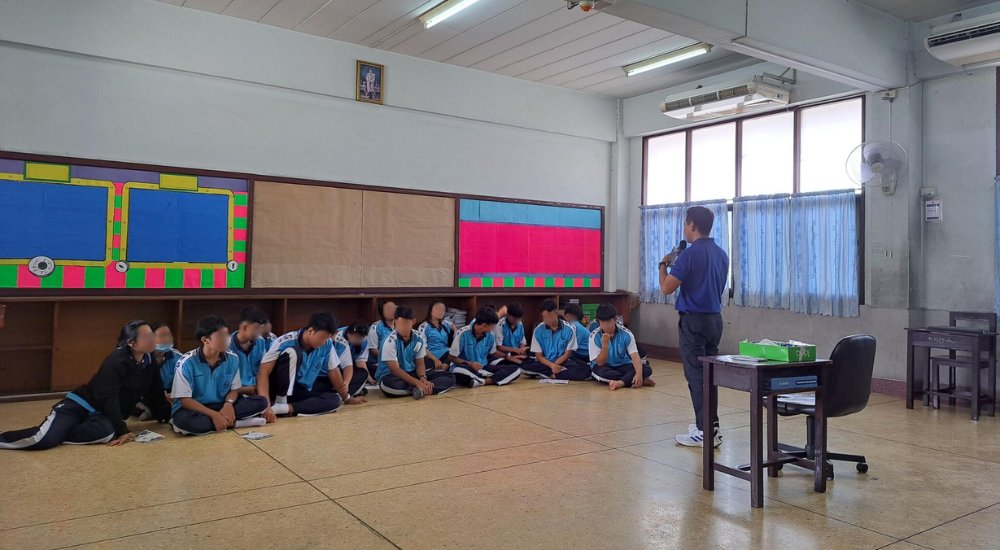
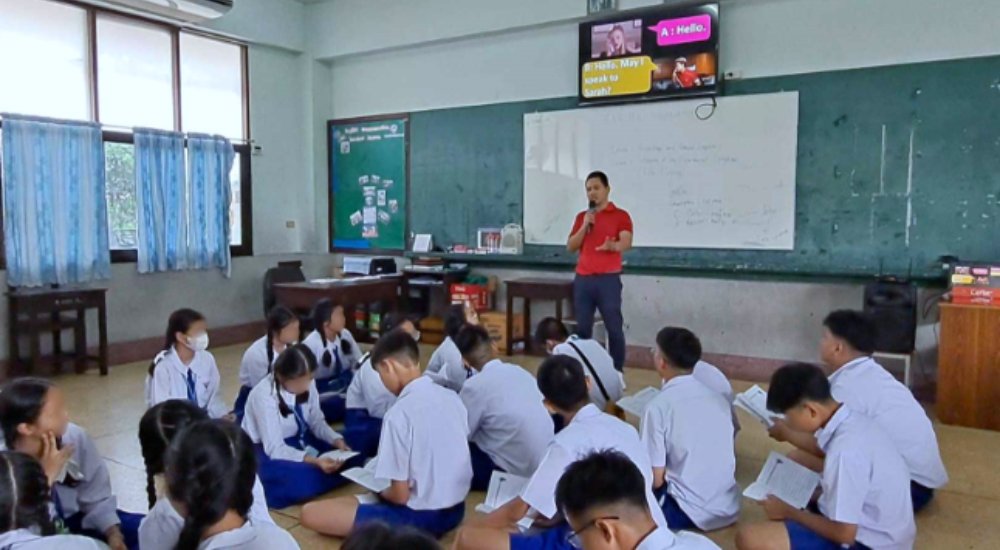

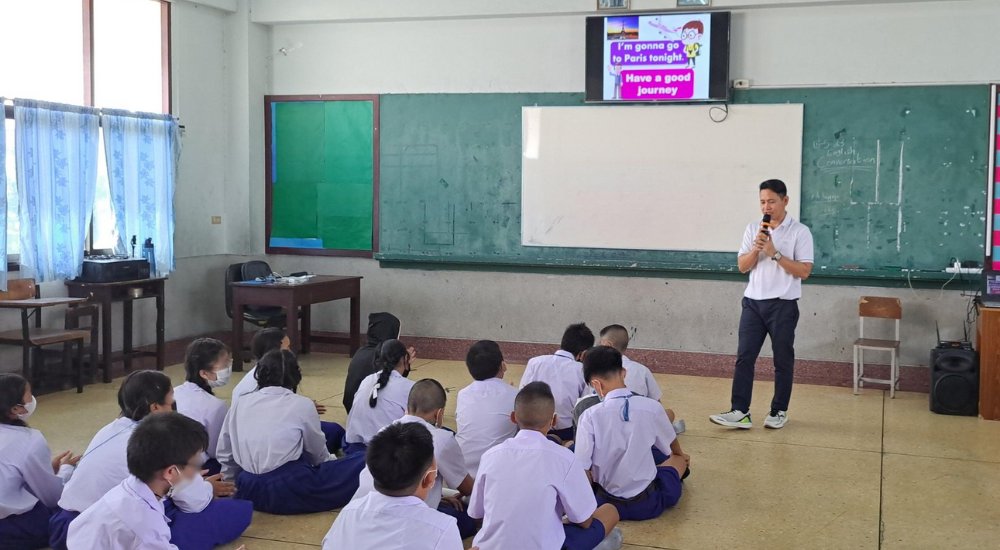












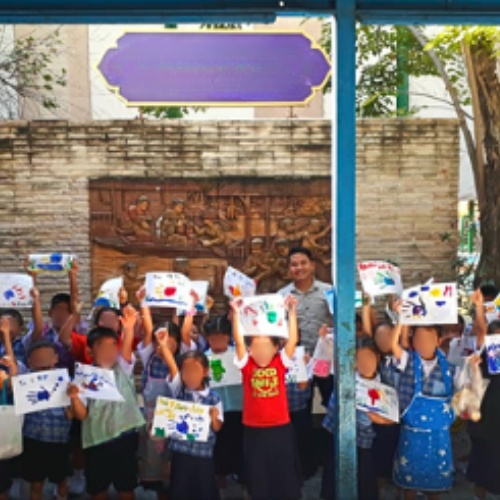


















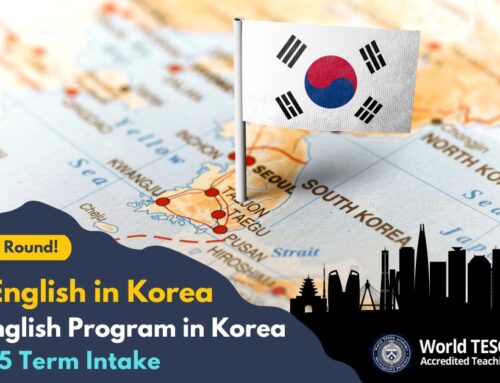

Leave A Comment